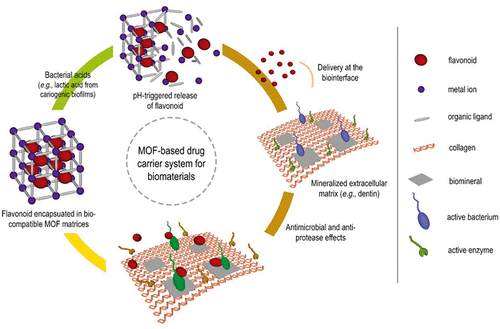当前位置:
X-MOL 学术
›
ACS Biomater. Sci. Eng.
›
论文详情
Our official English website, www.x-mol.net, welcomes your
feedback! (Note: you will need to create a separate account there.)
MOF-Based Erodible System for On-Demand Release of Bioactive Flavonoid at the Polymer–Tissue Interface
ACS Biomaterials Science & Engineering ( IF 5.4 ) Pub Date : 2020-06-29 , DOI: 10.1021/acsbiomaterials.0c00564 Odair Bim-Júnior 1 , Caroline Gaglieri 2 , Ana K. Bedran-Russo 3 , Bruno Bueno-Silva 4 , Gilbert Bannach 2 , Regina Frem 5 , Valdecir Farias Ximenes 2 , Paulo N. Lisboa-Filho 1
ACS Biomaterials Science & Engineering ( IF 5.4 ) Pub Date : 2020-06-29 , DOI: 10.1021/acsbiomaterials.0c00564 Odair Bim-Júnior 1 , Caroline Gaglieri 2 , Ana K. Bedran-Russo 3 , Bruno Bueno-Silva 4 , Gilbert Bannach 2 , Regina Frem 5 , Valdecir Farias Ximenes 2 , Paulo N. Lisboa-Filho 1
Affiliation

|
Plant-derived compounds incite applications virtually on every biomedical field due to the expedient antioxidant, anti-inflammatory and antimicrobial properties in conjunction with a natural character. Here, quercetin (QCT), a flavonoid with therapeutic potentials relevant to the oral environment, was encapsulated within metal–organic frameworks (MOFs) to address the concept of on-demand release of phytochemicals at the biointerface. We verified the applicability of a microporous MOF (ZIF-8) as a controlled-release system for QCT, as well as investigated the incorporation of QCT@ZIF-8 microparticles into a dental adhesive resin for desirable therapeutic capabilities at the tooth–restoration interface. QCT was encapsulated within the frameworks through a water-based, one-step synthetic process. The resulting QCT@ZIF-8 microparticles were characterized with respect to chemical composition, crystal structure, thermal behavior, micromorphology, and release profile under acidic and physiological conditions. A model dental adhesive formulation was enriched with the bioactive microparticles; both the degree of conversion (DC) of methacrylic double bonds and the polymer thermal behavior were accounted for. The results confirm that crystalline QCT@ZIF-8 microparticles with attractive loading capacities, submicron sizes, high thermal stability and responsiveness to environmental pH change were successfully manufactured. The concentration of QCT@ZIF-8 in the resin system was a key factor to maintain an optimal DC plateau and rate of polymerization. Essentially, one-step encapsulation of QCT in biocompatible ZIF-8 matrices can be easily achieved, and QCT@ZIF-8 microparticles proved as smart platforms to carry bioactive compounds with potential use to prevent microbial and enzymatic degradation of hard tissues and extracellular matrix components.
中文翻译:

基于MOF的可侵蚀系统,用于按需释放聚合物-组织界面上的生物活性类黄酮
得益于抗氧化剂,抗炎和抗菌特性以及自然特性,植物衍生的化合物几乎可以在每个生物医学领域中广泛应用。在这里,槲皮素(QCT)是一种具有与口腔环境相关的治疗潜力的类黄酮,被包裹在金属有机框架(MOF)中,以解决在生物界面上按需释放植物化学物质的概念。我们验证了微孔MOF(ZIF-8)作为QCT控释系统的适用性,并研究了将QCT @ ZIF-8微粒掺入牙科用粘合剂树脂中以在牙齿修复界面获得理想的治疗能力。QCT通过水基一步合成过程封装在框架中。在酸性和生理条件下,针对化学组成,晶体结构,热行为,微观形貌和释放特性对所得的QCT @ ZIF-8微粒进行了表征。一种典型的牙科胶粘剂配方中富含生物活性微粒。都考虑了甲基丙烯酸双键的转化度(DC)和聚合物的热行为。结果证实,成功制备了具有吸引人的负载能力,亚微米尺寸,高热稳定性和对环境pH值变化敏感的QCT @ ZIF-8晶体。树脂体系中QCT @ ZIF-8的浓度是维持最佳DC平稳期和聚合速率的关键因素。从本质上讲,可以轻松实现QCT在生物相容性ZIF-8基质中的一步封装,
更新日期:2020-06-29
中文翻译:

基于MOF的可侵蚀系统,用于按需释放聚合物-组织界面上的生物活性类黄酮
得益于抗氧化剂,抗炎和抗菌特性以及自然特性,植物衍生的化合物几乎可以在每个生物医学领域中广泛应用。在这里,槲皮素(QCT)是一种具有与口腔环境相关的治疗潜力的类黄酮,被包裹在金属有机框架(MOF)中,以解决在生物界面上按需释放植物化学物质的概念。我们验证了微孔MOF(ZIF-8)作为QCT控释系统的适用性,并研究了将QCT @ ZIF-8微粒掺入牙科用粘合剂树脂中以在牙齿修复界面获得理想的治疗能力。QCT通过水基一步合成过程封装在框架中。在酸性和生理条件下,针对化学组成,晶体结构,热行为,微观形貌和释放特性对所得的QCT @ ZIF-8微粒进行了表征。一种典型的牙科胶粘剂配方中富含生物活性微粒。都考虑了甲基丙烯酸双键的转化度(DC)和聚合物的热行为。结果证实,成功制备了具有吸引人的负载能力,亚微米尺寸,高热稳定性和对环境pH值变化敏感的QCT @ ZIF-8晶体。树脂体系中QCT @ ZIF-8的浓度是维持最佳DC平稳期和聚合速率的关键因素。从本质上讲,可以轻松实现QCT在生物相容性ZIF-8基质中的一步封装,











































 京公网安备 11010802027423号
京公网安备 11010802027423号